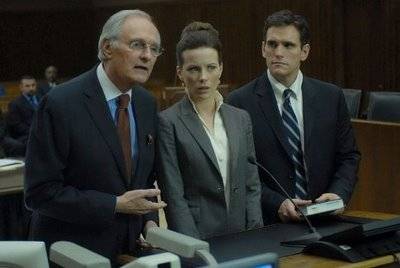 Perhaps the feature that generated the most divisive response from the crowd at this year’s Ebertfest was reserved for Rod Lurie’s Nothing but the Truth. Consistently engaging, often manipulative and, in the end, a bit unsatisfying, the political drama must be commended for focusing on thorny moral issues that spell doom at today’s box office. Freedom of the press, national security and the value of staying true to your moral code are hardly the sort of topics you find in normal run-of-the-mill multiplex fodder. The film’s strongest suit is that it puts these issues front and center in an engaging story that hooks you from the start.
Perhaps the feature that generated the most divisive response from the crowd at this year’s Ebertfest was reserved for Rod Lurie’s Nothing but the Truth. Consistently engaging, often manipulative and, in the end, a bit unsatisfying, the political drama must be commended for focusing on thorny moral issues that spell doom at today’s box office. Freedom of the press, national security and the value of staying true to your moral code are hardly the sort of topics you find in normal run-of-the-mill multiplex fodder. The film’s strongest suit is that it puts these issues front and center in an engaging story that hooks you from the start.
Kate Beckinsale is Rachel Armstrong, a Washington D.C. reporter who creates a firestorm when she runs a story claiming that a report filed by CIA agent Erica van Doren (Vera Farmiga) — which states that a Central American country suspected of engineering an assassination attempt on the President is innocent of this suspicion — was ignored by the Commander-in-Chief who went ahead and invaded the nation. With talk of impeachment beginning to rise, a special counselor, Patton Dubois (Matt Dillon), is charged with getting Armstrong to reveal her source, so that the leak of this information can be found and jailed. Despite many attempts, some friendly, some threatening, the reporter refuses to reveal her source and winds up going to jail, for contempt, for what she thinks will be a short stay. However, nearly a year later, Armstrong is still behind bars, her family in tatters, but her determination resolute.
Lurie’s script is quite smart as it is driven by smartly written dialogue and witty bon mots, all of the delivered with relish by his strong cast. In addition to Beckinsale, Dillon and Farmiga, Alan Alda appears as Armstrong’s lawyer, Noah Wylie pops up as counsel for the newspaper she writes for, Angela Bassett is her editor and David Schwimmer rounds out the main cast as Armstrong’s beleaguered husband. Each gives strong performances and it is to Lurie’s credit as a director that he is able to balance his cast so that no one performance overshadows another. This is ensemble acting at its finest and their collective efforts elevate the script and, more importantly, keep us engaged and distracted so that we might stay enthralled until the film’s conclusion.
While the film is a manipulative one, its strongest suit is that it provides the viewer with a even-handed approach to each of its characters. While Dubois might be viewed as the villain of the piece, he is seen so by default, as he is the one intent on putting our heroine in the Crossbar Hotel. However, as Dillon pointed out in the film’s far-too-short Q & A session following the screening, his character believes he is doing the right thing in trying to ferret out someone he believes to be a traitor. Each of the other characters face a crisis of conscience at one point or another and while we may not agree with their responses to their troubles personally, we are able to at least understand where they are coming from.
Ironically, the one character who begins to alienate us is Armstrong herself. While she is to be commended for standing up for her Constitutional rights, when we see the toil it takes on her husband, and more importantly her young son, we question her stance. She goes from crusader to martyr to masochist once her source is revealed to the viewer, and we realize the cost she paid is far too high as her stance defies logic in the light of day.
(SPOILER ALERT – Really, if Armstrong had revealed the identity of her “source” to Dubois, don’t you think common sense would have kicked in, the special prosecutor would have understood why she took her stance and the whole thing could have been swept under the rug? A statement to the press that the leak had been found and been dealt with internally would have sufficed. After all, the Feds have gotten away with much worse.)
The audience took Lurie to task for some of the script’s logical shortcomings and he took this criticisms with a degree of uncommon grace. Political leanings were obvious in those who directed their questions towards the stage, as well as in those engaged in the many side conversations that were going on around the theater. And in the end, isn’t that what a good drama is all about? Despite Truth’s faults, it does manage to engage those who see it in conversation about its essential moral questions. While the multiplex minions are overcharged for two hours of escapism, those who seek out films like Truth are rewarded not only for the time they spend watching the film, but the engaging conversations and debates that arise after seeing it. The difference between the cinema and the movies is never more apparent than when Ebert brings his cinematic circus to town.








